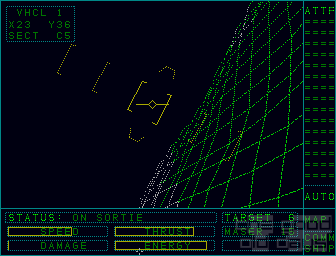What, apart from Dungeons & Dragons, remains ever popular in nerd culture? Right, Star Trek. Freshly revived with the phenomenally successful second movie Wrath of Khan, it didn't come as a big surprise that Steve Jackson selected this franchise to get the fourth entry to his Fighting Fantasy series of gamebooks inspired by. At least under the assumption that moving out of the sword and sorcery fantasy comfort zone was a good move at all.

Right from the start, Jackson makes it clear that this book will be different. Players are obliged to roll stats for several characters as well as the starship. The player takes the role of the square-jawed captain, but alongside, there are a science officer, a security officer, a medical officer… Each with their own abilities which may come into play sooner or later.
The journey consisting of space travel as well as episodes on different planets where selectable landing parties can be beamed down for small, mostly self-contained adventures. Indeed, the whole thing is a bit of a scavenger hunt for space and time coordinates. Though then, this is really just an excuse to send players from A to B to C and F. The episodes cover the usual suspects, like an oppressive robot regime, a primitive society where a regular human is worshipped as a god due to his advanced technology, finding yourself in the middle of gladiatorial games etc.
It is therefore quite a varied adventure. Though writing is flat and rushed. The themes are there, but this atmosphere thing everyone is craving for just won't show its head. On the language side, it is strange and inexcusable. The short length of each episode also plays a part here, however, and that one is not as clearly negative. After all, in such a setup, you don't want to lose yourself in a long-ish deep dive of one planet while forgetting about the big picture of the journey. At least, the book maintains some balance with respect to that. It does result in the overall shortest book of the whole line nevertheless, spanning only 340 sections end to end.
That's not all. Easily, there will be playthroughs in which all these new mechanics of ship combat, phaser duels etc. never occur at all. Indeed, the ideal solution does not contain a single fight of any kind, no skill or luck roll of any character. No need to ever touch the dice after initially rolling all those stats. Seems Jackson was more interested in devising all those gameplay systems than actually applying them to real game situations. Which makes some sense, as especially those group brawls take much too long when played out by those rules. In that respect, it may be good if they don't occur so often. Though then, why make up a mechanic which is no fun in the first place?

Instead, the challenge of solving it lies in finding the right solution among all those branches, among all those red herrings laid out. Solving the book, on this background, is not a very satisfying experience, because it is essentially pure trial & error on choices which can only be taken at random. Literally, when walking a featureless maze of left-right decisions. Less so when a large number of choices simply boil down to “do you want to continue this encounter or skip to the next one?” One way or another, not at all a more satisfying choice to make.
On top, there is some weird cause and effect relation going on. For instance, how exactly can it be logically explained that the choices of where the ship can travel next from planet A is determined by whether the crew beamed down on said planet or not?
The strength therefore should have really been in the thematic storytelling. That remaining so sketchy, it is hit-and-miss at best. Worse, what made classic Star Trek so popular was the human interaction within the crew. The constant bickering between Spock and McCoy etc. The equivalent roles in Starship Traveller are devoid of any character. They are “used” in very mechanical ways, like tools, showing no personality. The way they appear, they are not different from the equipment bought from the wizard Yaztromo at the beginning of Forest of Doom. Utterly disappointing.
The will to innovate, to experiment, both in terms of theme and gameplay mechanics, has to be applauded. The unwillingness or inability to mould this into a good playing experience is unfortunate. Starship Traveller is a book for completionists. Highly interesting from a perspective of the development of the series, but one to be skipped if looking for actually engaging entertainment.


Comments (1) [Post comment]